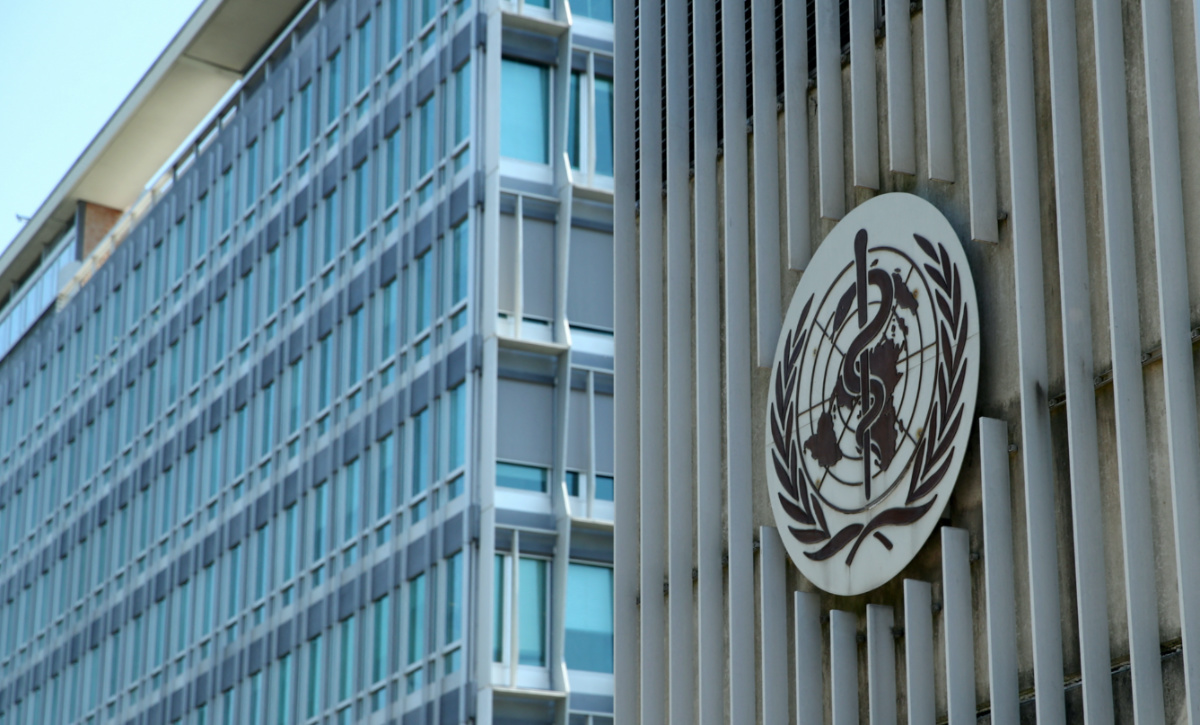Geneva, Switzerland
Reuters
COVID-19 vaccines appear to have become slightly less effective in preventing severe disease and death but do provide “significant protection”, the World Health Organization said on Tuesday.

A logo is pictured on the headquarters of the World Health Orgnaization (WHO) in Geneva, Switzerland, on 25th June, 2020. PICTURE: Reuters/Denis Balibouse.
The Omicron variant first detected in South Africa and Hong Kong last month has now been reported by 77 countries and is probably present in most worldwide, but should not be dismissed as “mild”, WHO Director-General Tedros Adhanom Ghebreyesus said.
“Omicron is spreading at a rate we have not seen with any previous variant,” Tedros told an online briefing. “Even if Omicron does cause less severe disease, the sheer number of cases could once again overwhelm unprepared health systems.”
AFRICA SEES 83 PER CENT SURGE IN COVID CASES IN PAST WEEK
Africa is experiencing its fastest surge in COVID-19 cases this year, with the number up 83 per cent in the past week, although deaths remain low, the World Health Organization said on Tuesday.
The spike in cases is driven by the Delta and Omicron variants, the WHO said in a statement. The number of new COVID-19 cases on the continent is currently doubling every five days, the shortest time frame reported this year.
Africa’s low inoculation rates have encouraged viral mutations like the new Omicron variant to spread, according to health experts. The continent struggled to obtain vaccine doses until recently, and is facing challenges to distribute them including lack of funds, staff and equipment.
As of Monday, only 20 African countries had vaccinated at least 10 per cent of their population, according to the WHO. Some countries, like Democratic Republic of Congo and Chad, have vaccinated less than one per cent, data collected by Reuters shows.
“We are cautiously optimistic that deaths and severe illness will remain low in the current wave, but slow vaccine roll-out in Africa means both will be much higher than they should be,” said Dr. Matshidiso Moeti, WHO regional director for Africa.
Africa recorded more than 196,000 new cases for the week ending on 12th December, up from around 107,000 the previous week, the WHO said. Deaths dropped by 19 per cent in the same period, it said, and have averaged about 1,000 per week in the fourth pandemic wave.
At the current pace, it will take until May, 2022, before Africa reaches 40 per cent vaccination coverage and August 2024 before it reaches 70 per cent, the WHO said.
– NELLIE PEYTON/Reuters
“Evolving evidence suggests a small decline in the effectiveness of vaccines against severe disease and death, and a decline in preventing mild disease or infection,” he said without giving specifics.
Pfizer-BioNTech’s COVID-19 vaccine has been less effective in South Africa at keeping people infected with the virus out of hospital since the Omicron variant emerged last month, a real-world study published on Tuesday showed.
Mike Ryan, WHO’s emergencies director, said that the vaccines are not failing and do provide significant protection against severe disease and death.
“The question is how much protection are the current vaccines that we are using, which are currently life-saving against all the variants, and to what extent do we lose any protection against severe illness and death against Omicron. The data is pointing towards there being significant protection.”
Ryan said the peak of this wave of infections remains “a number of weeks” away given the very rapid spread of the Omicron variant, which has outpaced the dominant global strain Delta.
Vaccine booster shots can play a role in curbing the spread of COVID-19 as long as people most in need of protection also get access to jabs, Tedros said.
“It’s a question of prioritisation. The order matters. Giving boosters to groups at low risk of severe disease or death simply endangers the lives of those at high risk who are still waiting for their primary doses because of supply constraints.
“On the other hand, giving additional doses to people at high risk can save more lives than giving primary doses to those at low risk,” he said.
Tedros noted that the emergence of Omicron had prompted some countries to roll out COVID-19 booster programs for their entire adult populations, even while researchers lack evidence for the efficacy of boosters against this variant.
“WHO is concerned that such programmes will repeat the vaccine hoarding we saw this year, and exacerbate inequity,” he said.




